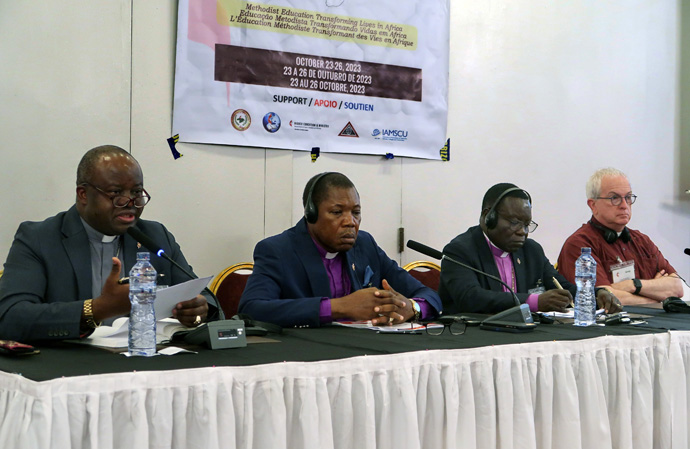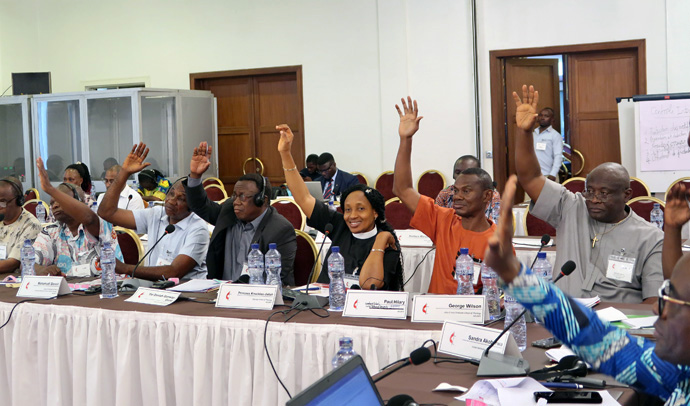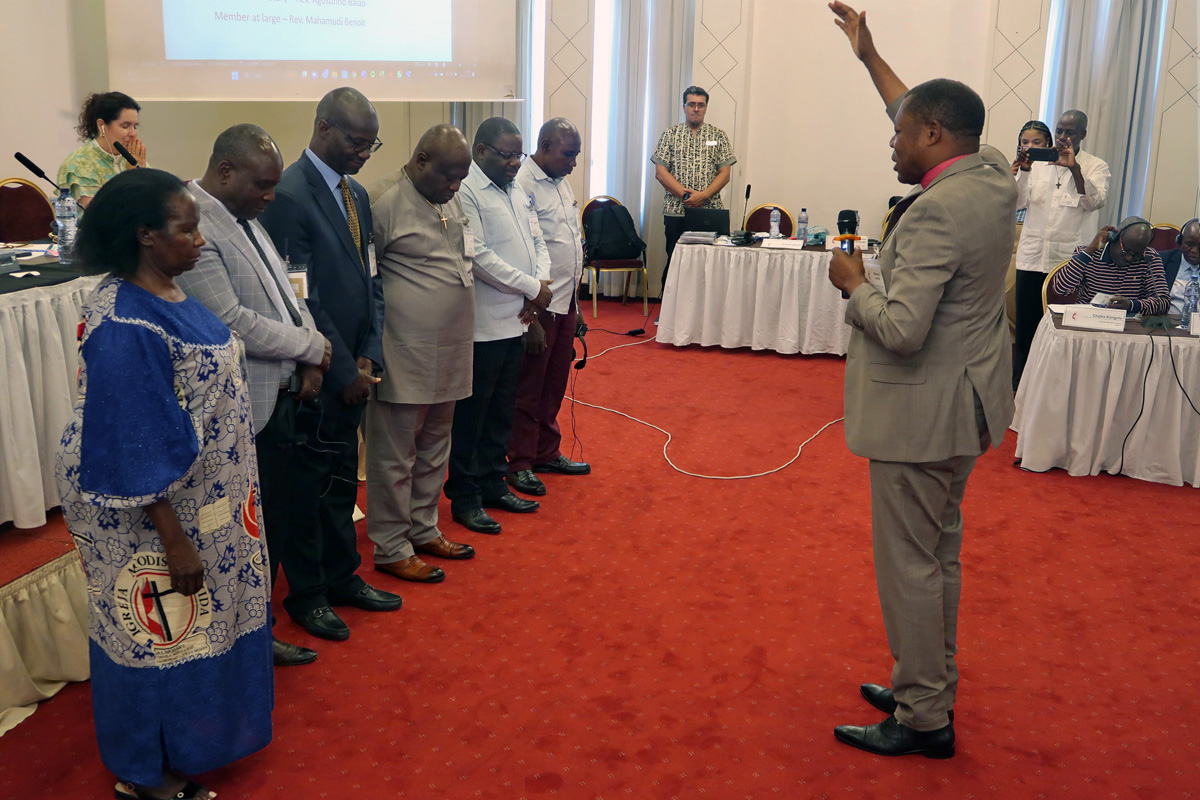Key points:
- Members were elected during the close of meetings in Kinshasa that brought together about 100 leaders of education institutions on the continent and staff from the United Methodist boards of Higher Education and Ministry and Global Ministries.
- For the first time, women will serve as the presidents of the two United Methodist education associations in Africa.
- Congo Central Conference bishops also had the opportunity to share their views on the regionalization petition headed to General Conference.
Leaders from United Methodist institutions of higher learning recently formed the first Africa senate to monitor and assess the quality of education delivered by the church on the continent.
The Africa Senate for Methodist Education comprises representatives from theological schools, universities and colleges. Members were elected during the close of meetings Oct. 23-26 in Kinshasa. Focusing on the theme “Methodist Education Transforming Lives in Africa,” the meetings brought together about 100 leaders of education institutions on the continent and staff from the United Methodist boards of Higher Education and Ministry and Global Ministries.
The Rev. Beauty R. Maenzanise, United Methodist Board of Higher Education and Ministry manager for contextual theological education and resourcing and director of the E-Reader Project, said the senate evolved from conversations that started in 2016 with theological schools in Maputo, Mozambique.
“The senate is a tool which is going to be used as a quality assurance entity for The United Methodist Church institutions,” she said. “It will be monitoring and assessing their service delivery. We want to make sure (of) excellent quality in our education in Africa.”

The senate’s creation occurred during the close of meetings Oct. 23-26 in Kinshasa. Focusing on the theme “Methodist Education Transforming Lives in Africa,” the meetings brought together about 100 leaders of education institutions on the continent and staff from the United Methodist boards of Higher Education and Ministry and Global Ministries.
The Africa Association of United Methodist Theological Institutions and the African Association of Methodist Institutions of Higher Education elected new leadership. For the first time, both of the associations’ presidents are women. The Rev. Virginie Umba of Kamina Methodist University in Congo will lead the association of theological institutions, while Rosemary Nyarugwe of Nyadire Teachers College in Zimbabwe will oversee the association of higher education institutions.
“We were mainly trying to map a way forward, especially for the senate,” Maenzanise said. “The time had come for the (Africa Association of United Methodist Theological Institutions) to elect new leadership for the association as we could not meet during the COVID-19 pandemic, and elections were long overdue.
“We continued conversations to see how we can strengthen relations between our partner agencies (Higher Education and Ministry and Global Ministries) and the two education associations,” she said.

Six representatives of the Africa Senate were elected at the Kinshasa meeting, and three more members from GBHEM staff will be appointed as liaisons.
During the meeting, the Rev. Greg Bergquist announced his retirement as Higher Education and Ministry top executive effective June 30. Roland Fernandes, top executive of Global Ministries, will lead both agencies next year.
Three bishops from the Congo Central Conference shared their views regarding the regionalization petition that will be before General Conference in 2024.
“In the Congo,” Bishop Daniel O. Lunge, said, “regionalization is nothing new. We lived with it for a long time. Our entire conferences are called ‘regions.’ (Regionalization) simply means Africanization of The United Methodist Church.”
North Katanga Area Bishop Mande Muyombo chairs the Connectional Table, a board of lay and clergy that coordinates the denomination’s mission and ministry, including general agency work. He shared key values of the regionalization petition with the education leaders. These include steps toward decolonizing The United Methodist Church’s structure and decision-making processes, increased missional effectiveness, removal of dominant culture, and honoring of each region’s culture and context.
Subscribe to our
e-newsletter
Bishop Kasap Owan of South Congo expressed reservations, saying The United Methodist Church must have one universal doctrine.
“We can keep the unity of the church if we have one church, one spirit, one faith and one God,” he said. “I don’t understand why we want to follow this way (regionalization).”
Bishops Lunge, Kasap and Mande expressed gratitude for the Central Conference Theological Education Fund that has enabled theological schools in Congo to thrive by providing support for many students.
The last physical meeting of African education leaders convened in 2019. This year, participants from the 49 institutions took time to remember illustrious education leaders who died. They included two vice chancellors: Munashe Furusa of Africa University and the Rev. Julio Andre Vilanculo of the United Methodist University of Mozambique.
“We lost some of our key leaders, members, students, partners and friends,” said the Rev James Labala, dean of the Gbarnga School of Theology in Liberia and immediate past president of the Africa Association of United Methodist Theological Institutions. “But in the midst of the losses, we sustained. God has given us the grace to be even stronger. In our efforts to cope with the challenges created by crisis, new waves of creativity developed throughout our various institutions.
“During the pandemic, we developed new ideas of remaining committed to our education and developed skills in utilizing technology to modify our teaching and learning practices,” he continued. “While some of us could not meet in person in our institutions, various media platforms became new tools for ministries for most, if not all, of us. We are now better than before.”
Chikwanah is a correspondent for UM News based in Harare, Zimbabwe.
News media contact: Julie Dwyer at (615) 742-5470 or newsdesk@umnews.org. To read more United Methodist news, subscribe to the free Daily or Weekly Digests.



